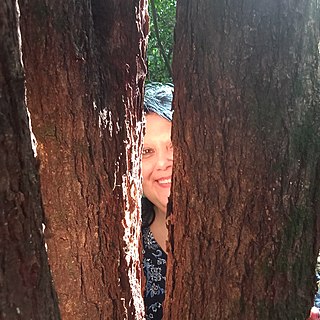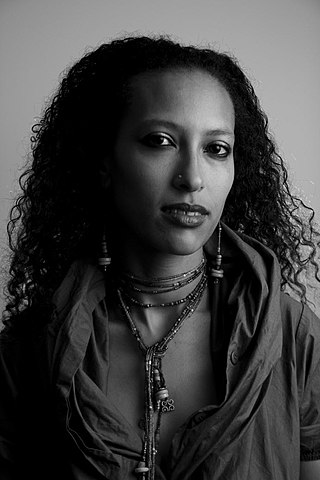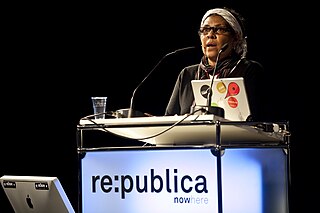Related Research Articles

Female genital mutilation (FGM) is the cutting or removal of some or all of the vulva for non-medical reasons. FGM prevalence varies worldwide, but is majorly present in some countries of Africa, Asia and Middle East, and within their diasporas. As of 2024, UNICEF estimates that worldwide 230 million girls and women had been subjected to one or more types of FGM.
Ernest Wamba dia Wamba was a prominent Congolese academic and political theorist who became a commander of the Kisangani faction of the rebel Rally for Congolese Democracy during the Second Congo War.

Efua Dorkenoo, OBE, affectionately known as "Mama Efua", was a Ghanaian-British campaigner against female genital mutilation (FGM) who pioneered the global movement to end the practice and worked internationally for more than 30 years to see the campaign "move from a problem lacking in recognition to a key issue for governments around the world."
Contributing to the establishment of human rights system in Africa are the United Nations, international law and the African Union which have positively influenced the betterment the human rights situation in the continent. However, extensive human rights abuses still occur in many sections of the continent. Most of the violations can be attributed to political instability, racial discrimination, corruption, post-colonialism, economic scarcity, ignorance, illness, religious bigotry, debt and bad financial management, monopoly of power, lack/absence of judicial and press autonomy, and border conflicts. Many of the provisions contained in regional, national, continental, and global agreements remained unaccomplished.
Equality Now is a non-governmental organization founded in 1992 to advocate for the protection and promotion of the human rights of women and girls. Equality Now works through public policy channels to create a just world for women and girls. Through a combination of regional partnerships, community mobilization and legal advocacy the organization works to encourage governments to adopt, improve and enforce laws that protect and promote women and girls' rights around the world.
Pambazuka News is an open access, Pan-African e-mail and online electronic newsletter. It is published weekly in English, Portuguese and French by the not-for-profit organisation Fahamu. The word Pambazuka means "dawn" or "arise" in Kiswahili. Since its inception in 2000, the newsletter's mission has been to provide a platform for social justice in Africa, for example, by promoting human rights for refugees. As characterized by Firoze Manji, "the project differed from other publishing ventures in the sense that it was established not only to publish, but specifically to support an agenda for social change in Africa." Pambazuka News provides commentary and analysis on politics and current affairs. The estimated readership is 500,000.
Solidarity for African Women's Rights (SOAWR) is a coalition of 63 civil society organisations working across 32 African countries to protect women's rights. Established in 2004, SOAWR works to protect the rights of girls and women as articulated in the Protocol to the African Charter on the Rights of Women in Africa (“The Maputo Protocol”).
International Day of Zero Tolerance for Female Genital Mutilation is a United Nations-sponsored annual awareness day that takes place on February 6 as part of the UN's efforts to eradicate female genital mutilation. It was first introduced in 2003.

The Protocol to the African Charter on Human and Peoples' Rights on the Rights of Women in Africa, better known as the Maputo Protocol, is an international human rights instrument established by the African Union that went into effect in 2005. It guarantees comprehensive rights to women including the right to take part in the political process, to social and political equality with men, improved autonomy in their reproductive health decisions, and an end to female genital mutilation. It was adopted by the African Union in Maputo, Mozambique, in 2003 in the form of a protocol to the African Charter on Human and Peoples' Rights.

Sylvia Rosila Tamale is a Ugandan academic, and human rights activist in Uganda. She was the first woman dean in the law faculty at Makerere University, Uganda.
Fahamu is a not-for-profit organization supporting organizations and social movements championing progressive social change and human rights. With branches in the United Kingdom, South Africa, Senegal, and Kenya, Fahamu primarily engages with civil and human rights organizations through Pambazuka News, an online platform focusing on social justice. Additionally, they offer online courses on human rights and social justice and employ new technologies, including SMS, for information dissemination, lobbying, and interactions.
Research Action and Information Network for the Bodily Integrity of Women is an international non-governmental organisation working to eliminate female circumcision and female genital mutilation.

Firoze Madatally Manji is a Kenyan activist. He is the recipient of the 2021 Nicolás Cristóbal Guillén Batista Lifetime Achievement Award from the Caribbean Philosophical Association.

'Valentina Acava is a writer, educator and artivist. She is an outspoken advocate to end female genital mutilation (FGM) using artistic and educational Workshops. She was born into Italian and Greek parents and was raised in South Africa. She is the founder of Creative Encounters, an artistic platform for artists in East Africa.
Female genital mutilation in the United Kingdom is the ritual removal of some or all of the external female genitalia of women and girls living in the UK. According to Equality Now and City University London, an estimated 103,000 women and girls aged 15–49 were thought to be living with female genital mutilation (FGM) in England and Wales as of 2011.

Jessica Horn is a feminist activist, writer, poet, and an advisor on women's rights with Ugandan and Malian background. Her work focuses on women's rights, bodily autonomy and freedom from violence, and African feminist movement building. She was named as an African woman changemaker by ARISE Magazine and as one of Applause Africa's "40 African Changemakers under 40". She joined the African Women's Development Fund as director of programmes in October 2015.

Sokari Ekine is a Nigerian activist, blogger and author. She worked as a journalist at the Pambazuka News and has also written for Feminist Africa and New Internationalist. Ekine kept a blog between 2004 and 2014 in which she covered a number of topics including LGBTI rights, women's rights, and environmental issues. She has co-written or edited four books, and taught English to school children in Haiti.
Sibongile Ndashe is a South African lawyer and human rights activist. She has been involved in public interest law since 1999 and has worked for several women's rights and human rights organisations. She founded the Initiative for Strategic Litigation in Africa (ISLA) in 2014 and has worked to help lawyers across Africa bring cases to court involving gender identity and sexual orientation. She supports the incremental decriminalisation of homosexuality. In October 2017 she was arrested in Tanzania on charges of "promoting homosexuality" whilst discussing ways to challenge a ban on HIV/AIDS treatment by private health clinics.
Eugenia Date-Bah was a Ghanaian academic and author. She was a member of the Sociology department of the University of Ghana. She was elected fellow of the Ghana Academy of Arts and Sciences in 2005. Date-Bah once served as the Director of InFocus, an International Labour Organization programme that focused on crises response and reconstruction, she also once served as the manager of the International Labour Organization's Action Programme for equipping countries emerging from armed conflicts with skills and entrepreneurial training.
Hakima Abbas is a political scientist, feminist activist, writer, and researcher. In 2016, she became co-executive director of Association for Women's Rights in Development (AWID), an international feminist organization focused on promoting gender equality and women's rights globally.
References
- ↑ Pearl Atuhaire, 'A Compendium of Women in Peace and Security Processes in the East and Horn of Africa', February 17, 2014. SSRN 2397005
- ↑ 'African Leaders Must Act Now to Ratify the Protocol on the Rights of Women', Pambasuka News, 162, 24 June 2004. Reprinted in Firoze Manji; Patrick Burnett, eds. (2005). African Voices on Development and Social Justice: Editorials from Pambazuka News 2004. Fahamu/Pambazuka. pp. 101–103. ISBN 978-9987-417-35-3.
- ↑ 'Putting an End to Female Genital Mutilation: The African Protocol on the Rights of Women', Pambasuka News, 173, 9 September 2004. Reprinted in Firoze Manji; Patrick Burnett, eds. (2005). African Voices on Development and Social Justice: Editorials from Pambazuka News 2004. Fahamu/Pambazuka. pp. 114–5. ISBN 978-9987-417-35-3.
- ↑ Does Kenya have the courage to lead on women's rights in Africa, The Guardian , 21 April 2014. Accessed 10 March 2020.